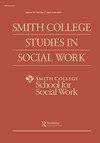Navigating Older Adults Service Provision during the COVID-19 Pandemic: A Qualitative Study of Bicultural and Bilingual Asian Human Service Workers
IF 0.9
Q2 SOCIAL WORK
引用次数: 1
Abstract
ABSTRACT The pandemic has spotlighted multiple long-standing inequities among marginalized populations. Of particular concern is the population of older Asian adults with limited English proficiency, who rely heavily on bicultural and bilingual Asian human service workers for culturally and linguistically appropriate service provision. With ever-evolving public health measures implemented during the COVID-19 pandemic, new challenges arose for bicultural and bilingual Asian human service workers to provide timely and appropriate care. To better understand the challenges among bicultural and bilingual Asian human service workers, this qualitative study explores how these workers changed their service provision in assisting older adults with limited English proficiency. Using the purposive sampling strategy, ten bicultural and bilingual Asian human service workers participated in the study that employed a phenomenological approach. Findings suggest that the workers need additional support to create a more comprehensive system of care for their older Asian clients who carry dual cultures and systems during the time of public health emergencies. Implications for social work and human service practice are offered.新冠肺炎大流行期间引导老年人服务提供:对双文化和双语亚洲人类服务工作者的定性研究
新冠肺炎大流行凸显了边缘人群长期存在的多重不平等现象。特别值得关注的是英语水平有限的亚洲老年人,他们严重依赖双文化和双语的亚洲人服务工作者提供文化和语言上合适的服务。随着2019冠状病毒病大流行期间实施的不断变化的公共卫生措施,双文化和双语亚裔人类服务工作者在提供及时和适当的护理方面面临新的挑战。为了更好地理解双文化和双语亚洲人类服务工作者所面临的挑战,本定性研究探讨了这些工作者如何改变他们在帮助英语水平有限的老年人方面的服务提供。采用有目的的抽样策略,10名双文化和双语的亚洲人力服务工作者参与了采用现象学方法的研究。研究结果表明,在突发公共卫生事件期间,工作人员需要额外的支持来为他们的老年亚洲客户建立一个更全面的护理体系,这些客户携带着双重文化和体系。对社会工作和人类服务实践的启示。
本文章由计算机程序翻译,如有差异,请以英文原文为准。
求助全文
约1分钟内获得全文
求助全文
来源期刊

SMITH COLLEGE STUDIES IN SOCIAL WORK
SOCIAL WORK-
CiteScore
1.50
自引率
10.00%
发文量
10
期刊介绍:
Smith College Studies in Social Work focuses on the vital issues facing practitioners today, featuring only those articles that advance theoretical understanding of psychological and social functioning, present clinically relevant research findings, and promote excellence in clinical practice. This refereed journal addresses issues of mental health, therapeutic process, trauma and recovery, psychopathology, racial and cultural diversity, culturally responsive clinical practice, intersubjectivity, the influence of postmodern theory on clinical practice, community based practice, and clinical services for specific populations of psychologically and socially vulnerable clients.
 求助内容:
求助内容: 应助结果提醒方式:
应助结果提醒方式:


